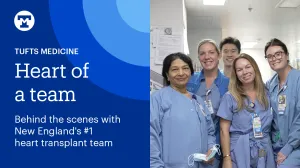Tufts Medicine today celebrated the 40th anniversary of the first adult heart transplant performed at Tufts Medical Center (Tufts MC), marking four decades of clinical excellence and innovation in advanced heart failure and cardiac transplantation care.
Since its launch on October 30, 1985, the Tufts MC Advanced Heart Failure and Cardiac Transplantation Program has grown into New England's gold standard for adult cardiac transplantation—leading the region in both volume and outcomes.
"Tufts Medical Center has performed more adult heart transplants than any other hospital in New England since 2000," said John Herman, President of Tufts Medical Center. "Our Advanced Heart Failure and Cardiac Transplantation Program continues to distinguish itself through exceptional outcomes and a legacy of innovation that other programs aspire to emulate."
The heart transplant program evolved from Tufts Medical Center's Advanced Heart Failure Program, founded several years earlier by Marvin Konstam, MD, a transplant cardiologist and former Chief Physician Executive of the CardioVascular Center at Tufts MC.
On October 30, 1985, Albert Plummer, a 49-year-old heart failure patient from Bath, Maine, became Tufts Medical Center's first heart transplant recipient—and only the second Maine resident ever to receive a donor heart. His new heart granted him 11 additional years of life, allowing him to witness his children's weddings, the births of two grandchildren, and milestone birthdays and anniversaries.
"We had gone through so much planning and preparation to reach that first transplant," recalled Dr. Konstam. "It was absolutely thrilling that it was such an enormous success. Looking back four decades later and seeing how many lives have been saved and extended is the most gratifying feeling in the world."
Over the past 40 years, Tufts Medical Center has performed 873 adult heart transplants. Since 2000, Tufts MC has completed 780 adult transplants—more than any other hospital in New England and over 75 more than the next-highest center.
"Building and sustaining a world-class cardiac transplantation program requires extraordinary commitment from countless clinical and non-clinical professionals," said David DeNofrio, MD, Director of Heart Failure Network Development at Tufts Medical Center and a key driver of the program's growth since the early 2000s. "Referring cardiologists across the region trust that their heart failure patients will receive the highest level of care here. Cultivating those relationships—and consistently delivering exceptional outcomes—has been central to our success."
"Advances in technology have completely transformed what's possible in heart transplantation," said Indranee Rajapreyar, MD, Medical Director of Cardiac Transplantation at Tufts Medical Center. "Innovations such as donation after circulatory death (DCD) and thoracoabdominal normothermic regional perfusion (TA-NRP) allow us to recover and preserve donor hearts in ways that were once unimaginable. These tools not only expand the donor pool but also help ensure the best possible outcomes for our patients."
"The success of our heart transplant program has always depended on the strength of our partnership between surgery and cardiology," said Gregory Couper, MD, Surgical Director of the Advanced Heart Failure Program at Tufts Medical Center. "From evaluating potential recipients to managing complex surgeries and long-term care, it's a true team effort. That collaboration has allowed us to deliver outstanding outcomes for patients and continually advance the field of heart transplantation."
In 2024, Tufts Medical Center performed 70 adult heart transplants, surpassing its own New England record of 61 from 2023. The milestone marked the third time in nine years that Tufts MC has set a new regional benchmark. No other New England center has reached even 60 in a single year. The institution also ranked 13th nationally in transplant volume last year, and set a national record for the longest distance a donor heart was transported—2,921 nautical miles.
Tufts MC's expertise extends beyond transplantation. The hospital is a national leader in left ventricular assist device (LVAD) implantation and a top enroller in clinical trials that have led to FDA approval of next-generation LVAD technologies. Its cardiology teams have pioneered innovative models for managing cardiogenic shock now used worldwide. In 2024, Becker's Hospital Review named Tufts MC among the 100 Hospitals and Health Systems with Great Heart Programs.
That same commitment to excellence is reflected across Tufts Medicine. MelroseWakefield Hospital and Lowell General Hospital each deliver outstanding cardiovascular care—whether through heart failure recognition by U.S. News & World Report or innovative community-based cardiac catheterization programs that achieve exceptional patient outcomes. Tufts Medicine Care at Home, the health system's home care and hospice organization, was the first home health organization in both Massachusetts and New Hampshire to earn home health heart failure certification from the American Heart Association.
"So many people have played a vital role in the growth and success of our heart transplant program," said James Udelson, MD, Interim Chief Physician Executive of the CardioVascular Center and Chief of Cardiology at Tufts Medical Center. "From Dr. Couper, Associate Surgical Director of the Advanced Heart Failure Program Dr. Aaron Sparks; and Associate Chief of Cardiology and Medical Director of the LVAD Program Dr. Michael Kiernan, to Dr. Rajapreyar, Dr. DeNofrio, Dr. Konstam and the legendary former Chair of Medicine Dr. Deeb Salem— each has made an incredible impact. I'm so proud of what we've accomplished over the past 40 years, and I'm just as excited about what's ahead."


